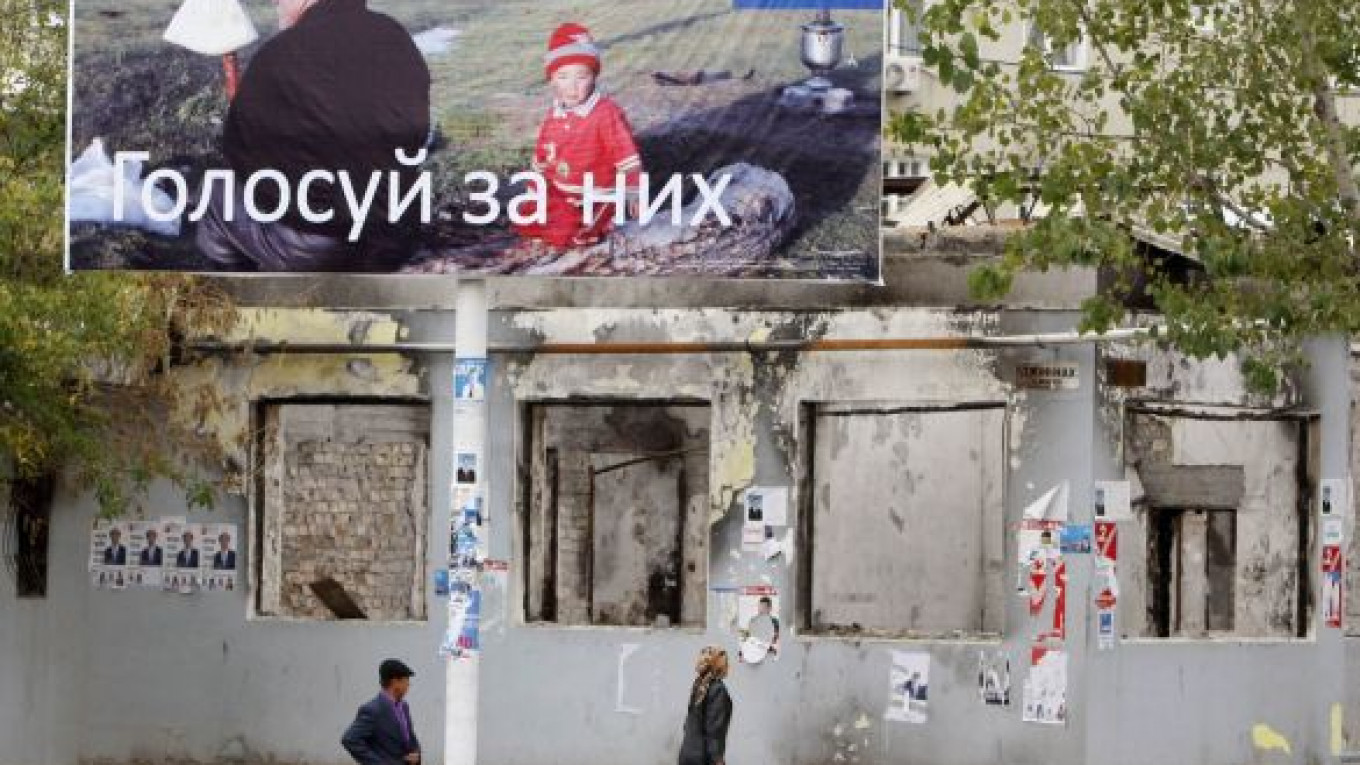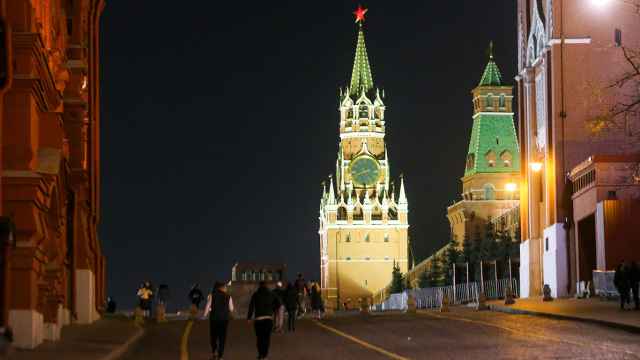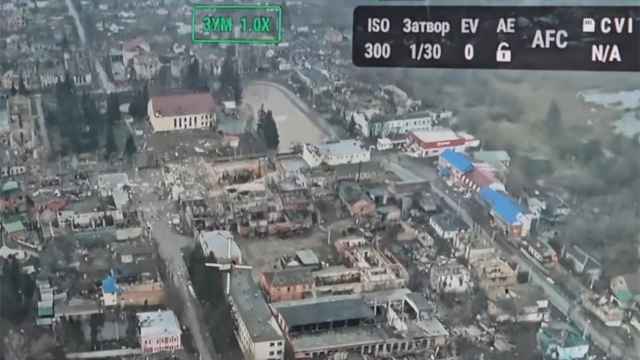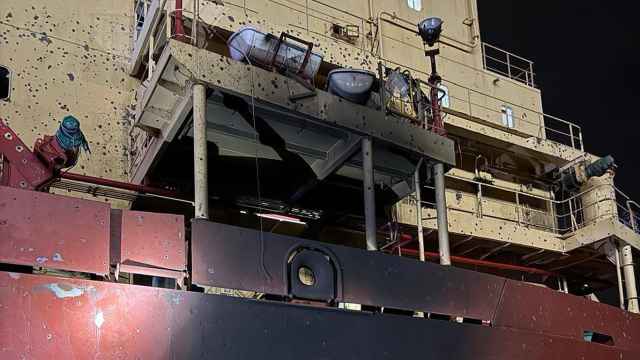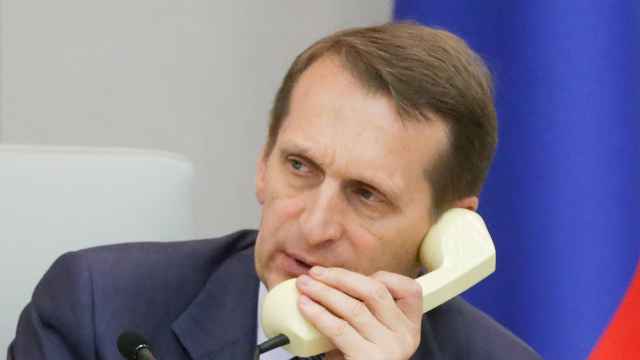BISHKEK, Kyrgyzstan — While Sunday's peaceful elections in Kyrgyzstan bode well for attempts to build Central Asia's first parliamentary democracy, the struggle for influence in a highly fragmented legislature is only just beginning.
Five parties won seats in the parliament after landmark elections aimed at shifting the strategic nation in a region dominated by post-Soviet strongmen away from failed authoritarian rule.
The United States and Russia, which have expressed opposing views on parliamentary rule in a country where both operate military air bases, will be interested in how quickly Kyrgyzstan can form an effective administration.
Only five of the 29 participating parties won seats in the parliament, and the most successful — Ata Zhurt — scored less than 10 percent of the total vote. Almost two-thirds of the electorate voted for parties that will not be represented.
The 120 seats in parliament will be split proportionately between the five parties that passed the entry threshold. The fragmented result means that the country is likely to be led by a coalition after much horse-trading.
Even a coalition between two parties would not produce a majority.
Mars Sariyev, an independent political analyst in Bishkek, said the three pro-parliamentary parties — the Social-Democratic Party of Kyrgyzstan, Respublika and Ata Meken — could form a coalition in support of a strong prime minister.
Ata Zhurt, whose members include former colleagues of exiled former President Kurmanbek Bakiyev, and the Ar-Namys party of former Prime Minister Felix Kulov have both said they are opposed to weakening presidential powers.
Kyrgyzstan's parliament must meet for its first session no later than 15 days after the final results of the election are known. Within a further 15 days, a parliamentary majority must put forward a candidate for prime minister.
Critics of the vote say the threat of violence persists, particularly if parties believe that they have been excluded from the new parliament or failed to win fair representation.
A relatively free and transparent election has cut this risk significantly. Ata Zhurt, popular among ethnic Kyrgyz in the south, won enough votes elsewhere to meet the stipulation that parties must score more than 0.5 percent in every region.
"Had Ata Zhurt or Ar-Namys failed to get into parliament, there was a risk of disorder," Sariyev said. "The battle now will be inside the parliament and not on the streets."
Ethnic Uzbeks see Kulov as their main representative. His close ties to Russia and his Ar-Namys party's promise of "the iron shield of the law" won many votes among Uzbeks living in burned-out regions of Osh.
Nevertheless, attempts by criminal groups to foment violence or any visible rise in Kyrgyz nationalism could spark clashes.
"If the Kyrgyz put the national issue to the forefront again, it will only get worse," said Mairam Ibragimova, a 44-year-old ethnic Uzbek and single mother of two in Osh.
The fate of the Manas U.S. military air base, a vital cog in the NATO war effort in Afghanistan, will not be decided before the new parliament is formed and is likely to be the subject of much debate among rival parties.
"A final decision will depend on the composition of the coalition government," said Omurbek Tekebayev, leader of the Ata Meken party. "Our party proposes to agree on all positions with our partners in the government."
Russia has been a strong critic of the parliamentary model, saying it would create factionalism as rival parties vie for power and leave the south of Kyrgyzstan vulnerable to a power grab by ethnic extremists or Islamist militants.
But Moscow will be encouraged by the strong performance of Kulov, whose Ar-Namys party finished a close third in the polls after campaigning on the platform of strong relations with the Kremlin. Moscow's voice will likely be heard in the parliament.
Kyrgyzstan's neighbors, already uncomfortable with a restive neighbor on their doorstep, may feel threatened by the emergence of a vibrant parliamentary democracy in the region.
Such a government is likely to be unpredictable and subject to change, in stark contrast to the unflinching rule of veteran powerful presidents in Kazakhstan and Uzbekistan.
A successful democracy in Kyrgyzstan might embolden opponents of the regimes in those countries to be more vocal.
"It is a strong message and a political message, and it cannot be underestimated," said Morten Hoeglund, head of the delegation of the Organization for Security and Cooperation in Europe Parliamentary Assembly.
A Message from The Moscow Times:
Dear readers,
We are facing unprecedented challenges. Russia's Prosecutor General's Office has designated The Moscow Times as an "undesirable" organization, criminalizing our work and putting our staff at risk of prosecution. This follows our earlier unjust labeling as a "foreign agent."
These actions are direct attempts to silence independent journalism in Russia. The authorities claim our work "discredits the decisions of the Russian leadership." We see things differently: we strive to provide accurate, unbiased reporting on Russia.
We, the journalists of The Moscow Times, refuse to be silenced. But to continue our work, we need your help.
Your support, no matter how small, makes a world of difference. If you can, please support us monthly starting from just $2. It's quick to set up, and every contribution makes a significant impact.
By supporting The Moscow Times, you're defending open, independent journalism in the face of repression. Thank you for standing with us.
Remind me later.


